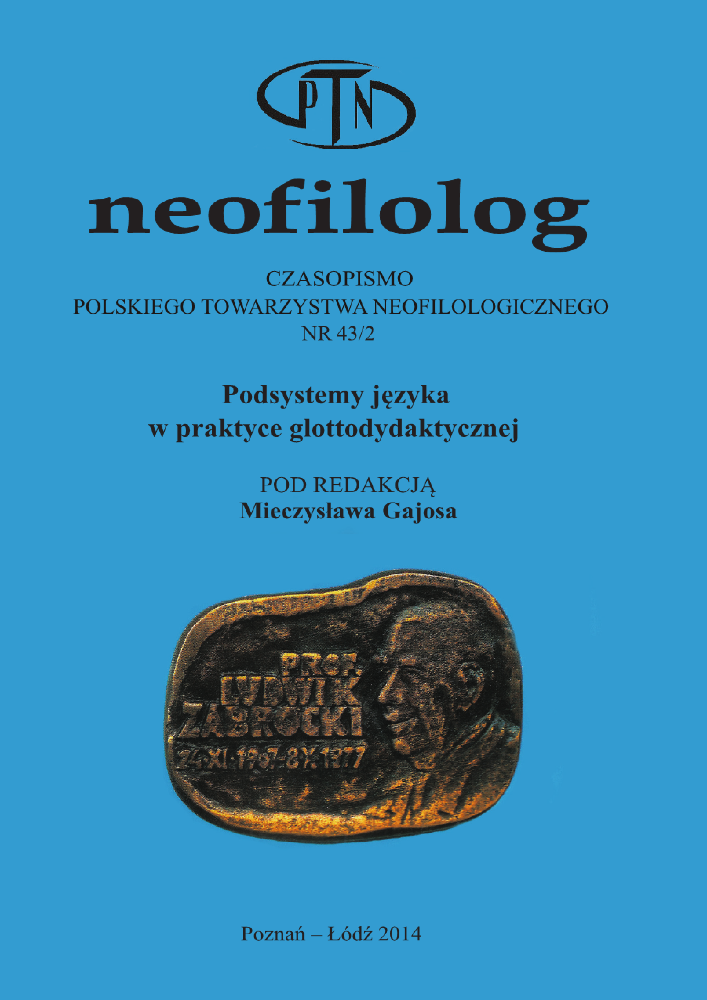Abstract
The paper attempts to describe language errors in the foreign language learning process. I have devoted attention to questions of context errors in the lexico-semantic subsystem made by Polish learners of German. Context errors appearing in statements of individual learning German are the result of interlingual interference process, at the base of which lie cultural differences, different ways of thinking and different kinds of experiences between the native language and the foreign language being learned.References
Bawej, I. 2008. Błąd leksykalny jako skutek procesów interferencyjnych. Poradnik metodyczny dla dydaktyków języka niemieckiego. Bydgoszcz: Wydawnictwo UKW.
Bünting, K.D. 1993. Einführung in die Linguistik. Frankfurt/Main: Antoin Hain.
Dakowska, M. 2008. Psycholingwistyczne podstawy dydaktyki języków obcych. Warszawa: Wydawnictwo Naukowe PWN.
Diller, H.J., Kornelius, J. 1978. Linguistische Probleme der Übersetzung. Tübingen: Niemeyer.
Grucza, F. 1978. «Ogólne zagadnienia lapsologii». (w) Z problematyki błędów obcojęzycznych (red. Grucza, F.). Warszawa: WSiP. 9-59.
Grzegorczykowa, R. 1999. «Pojęcie językowego obrazu świata». (w) Językowy obraz świata (red. Bartmiński, J.). Lublin: Wydawnictwo UMCS. 39-46.
Iluk, J. 1977. «Przyczyny błędów w doborze i użyciu wyrazów w języku obcym». Języki Obce w Szkole 3: 100-108.
Kaczmarski, S.P. 1988. Wstęp do bilingualnego ujęcia nauki języka obcego. Warszawa: WSiP.
Kaczmarski, S.P. 2002. «Gramatyka a funkcjonalno-komunikacyjne nauczanie języka obcego». Języki Obce w Szkole 2: 19-22.
Kadrič, M., Kaindl, K., Kaiser-Cooke, M. 2010. Translatorische Methodik. Wien: Facultas Verlag und Buchhandels AG.
Komorowska, H., Obidniak, D. 2002. Stopień po stopniu. Rozwój zawodowy nauczyciela języków obcych. Warszawa: Wydawnictwo Naukowe PWN.
Korzeniewska-Rogalewicz, J. 1986. Błąd leksykalny a dydaktyka języka obcego. Na materiale języka rosyjskiego. Warszawa: Wydawnictwo UW.
Lipiński, K. 2000. Vademecum tłumacza. Kraków: Wydawnictwo Idea.
Łuczyński, E., Maćkiewicz, J. 2002. Językoznawstwo ogólne. Wybrane zagadnienia. Gdańsk: Wydawnictwo Uniwersytetu Gdańskiego.
Maier, W. 1991. Fremdsprache in der Grundschule. Eine Einführung in ihre Didaktik und Methodik. Berlin und München: Langenscheidt.
Pisarska, A. 1996. «Najważniejsze kierunki badań translatologicznych». (w) Współczesne tendencje przekładoznawcze. Podręcznik dla studentów neofilologii (red. Pisarska, A., Tomaszkiewicz, T.). Poznań: Wydawnictwo Naukowe UAM. 11-59.
Rösler, D. 1994. Deutsch als Fremdsprache. Stuttgart-Weimar: J.B. Metzler.
Sapir, E. 1978. Kultura, język, osobowość. Warszawa: Państwowy Instytut Wydawniczy.
Saint-Exupéry, A. de. 1991. Mały książę. Warszawa: Instytut Wydawniczy PAX.
Saussure, F. de. 1991. Kurs językoznawstwa ogólnego (Przekład: K. Kasprzyk). Warszawa: PWN.
Szulc, A. 1978. «Typen sprachlicher Interferenz». (w) Deutsch als Fremdsprache (red. Nickel, G.). Stuttgart: Hochschule Verlag. 225-234.
Szulc, A. 1994. Słownik dydaktyki języków obcych. Warszawa: Wydawnictwo Naukowe PWN.
Tabakowska, E. 2001. Kognitywne podstawy języka i językoznawstwa. Kraków: Uniwersitas.
Trawiński, M. 1999. «Znajomość słownictwa i związków frazeologicznych u absolwentów szkół średnich». Języki Obce w Szkole 1: 23-31.
Wierzbicka, A. 1965. O języku dla wszystkich (Wydanie II rozszerzone). Warszawa: Wiedza Powszechna.
Wierzbicka, A. 2007. Słowa klucze. Różne języki – różne kultury (Przekład Izabela Duraj-Nowosielska). Warszawa: Wydawnictwo Uniwersytetu Warszawskiego.
License
Copyright (c) 2019 Neofilolog

This work is licensed under a Creative Commons Attribution-NoDerivatives 4.0 International License.
Authors
Authors of texts accepted for publication in Neofilolog are required to complete, sign and return to the Editorial team’s office the Agreement for granting a royalty-free license to works with a commitment to grant a CC sub-license.
Under the agreement, the authors of the texts published in Neofilolog grant Adam Mickiewicz University in Poznań a non-exclusive, royalty-free license and authorize the use of Attribution-NoDerivatives 4.0 International (CC BY-ND 4.0) Creative Commons sub-license.
The authors retain the right to the free disposal of the work.
Users
Interested Internet users are entitled to use works that have been published in Neofilolog since 2017, under the following conditions:
▪ attribution – obligation to provide, together with the distributed work, information about the authorship, title, source (link to the original work, DOI) and the license itself.
▪ no derivatives – the work must be preserved in its original form. Without the author's consent, it is not possible to distribute the modified work in the form of translations, publications, etc.
Copyrights are reserved for all texts published since 2017.
Miscellaneous
Adam Mickiewicz University in Poznań retains the property right as a whole (layout, graphic form, title, cover design, logo etc.).
